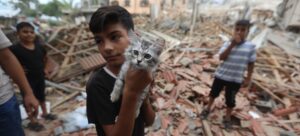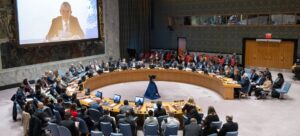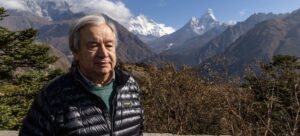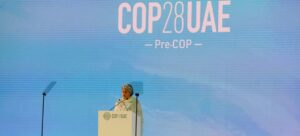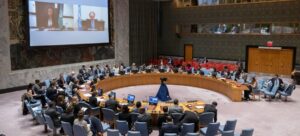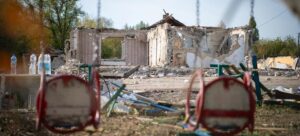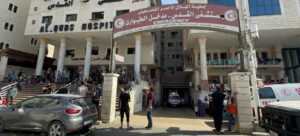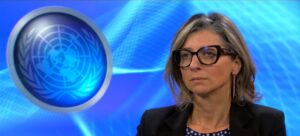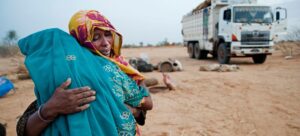The Council meeting has ended, and here are the key points of the day focused on the UN’s humanitarian effort:
Meeting Highlights
- UAE and China called for the emergency meeting after Israel expanded its ground operations into Gaza over the weekend
- Philippe Lazzarini, head of UNRWA, briefed ambassadors on the dire humanitarian situation in the ravaged enclave, stressing women and children cannot be “collateral damage”
- UNICEF chief Catherine Russell outlined the impact on children on both sides who are experiencing terrible trauma, “the consequences of which could last a lifetime”
- Lisa Doughten, senior UN humanitarian official from OCHA, underscored the need for a pause in the fighting to provide respite for desperate civilians “living under unimaginably traumatic conditions”
- Security Council members recalled Friday’s General Assembly resolution on the crisis, reiterating that international humanitarian law must be respected
- On Tuesday the General Assembly continues its emergency special session on the crisis, expected to reconvene at 3 PM New York time
For a reminder of how the Security Council works during a crisis and negotiates resolutions or ends up in deadlock, visit our explainer here.
7:10 PM
Israel: We’ll defend ourselves against annihilation
Gilad Erdan, Ambassador and Permanent Representative of Israel to the UN, said the agricultural villages in southern Israel invaded by Hamas terrorists were peaceful, akin to his grandparents’ village in Transylvania.
Ambassador Gilad Erdan of Israel addresses the UN Security Council meeting on the situation in the Middle East, including the Palestinian question.
“Entire communities were exterminated, only this time the murderers were Hamas Nazis. Entire Israeli families were turned into smoke and ash – no different than the fate my grandfather’s family met in Auschwitz,” he said.
“The brutality of the crimes is not the only thing that the savage Hamas Nazis share with the German Nazis. They both share a common ideology,” he added, to “exterminate the Jews”.
Ambassador Erdan said that the “Ayotallah regime” in Iran “is the modern Nazi regime, and their death squads include Hamas, Palestinian Islamic Jihad, Hezbollah, Houthis, Revolutionary Guard, and other savage jihadists.”
“Just like the Nazi regime, the Ayotallah regime sows death and destruction everywhere it touches,” he said.
Mr. Erdan noted that over 250,000 Israeli civilians have been displaced since their war on Hamas began on 7 October and that millions more are living under constant and indiscriminate rocket fire “at the hands of Hamas, Hezbollah and other jihadists”.
“Does this Council not have anything to say about this? Is this not also part of the situation in the Middle East?” he said, accusing the Security Council of being “silent” when atrocities are committed against innocent Jewish civilians, including children.
“Some Member States have learned nothing in the past 80 years. Some of you have forgotten why this body was established, so I will remind you, from this day on each time you look at me, you will remember me what staying silent in the face of evil means,” he said, adding “just like my grandparents and the grandparents of millions of Jews, from now on my team and I will wear yellow stars.”
The Ambassador stood up and placed a yellow star on his suit, along with his delegation.
“We will wear this star, until you condemn the atrocities of Hamas and demand the immediate release of our hostages,” he declared, adding “we walk with a yellow star as a symbol of pride, a reminder that we swore to fight back to defend ourselves.”
Ambassador Erdan said antisemites “have been empowered”, and that they are calling for the killing of Jews in several countries around the world. He asked if the Security Council would stand by silently as the hatred against Jews grows, and if it would “take the approach of Chamberlin to appease the Nazis and its sympathizers”, or rather model Britain’s war leader Winston Churchill “to fight evil with blood, toil, tears and sweat.”
He stressed that the Israeli people are strong, “we are unbreakable, and we are going nowhere”.
“Many have tried to destroy us, the Babylonians, the Greeks, the Romans and the Nazis, to name just a few, but none have succeeded. And the Iranian Reich will be no different,” he said, adding “Israel will prevail, God willing. We will bring our hostages home, and the citizens of the Jewish State will live in peace and freedom.”
6:10 PM
Palestine: ‘Gaza is now hell on Earth’
Riyad Mansour, Permanent Observer of the observer State of Palestine, thanked the UN agency briefers for their “moving calls” for action from the field, in a bid to save more Palestinian lives in Gaza.
Riyad Mansour, Permanent Observer of the State of Palestine to the United Nations, addresses the UN Security Council meeting on the situation in the Middle East, including the Palestinian question.
He said the UN’s call for 100 trucks a day needed to be heeded.
They are the best face of the UN, he said, expressing appreciation for the Secretary-General’s call for a humanitarian ceasefire at the gates of the Rafah crossing last week.
He told ambassadors “Gaza is now hell on Earth.”
“Saving humanity from hell today means for the UN to save Palestinians in Gaza,” he said, providing a snapshot of life on the ground there, with more than half the population forcibly displaced, constantly moving and being killed wherever they go.
He said half the homes in Gaza are now damaged or destroyed, with over 1.4 million forcibly displaced. “Virtually all of our people in Gaza are displaced”, sleeping in cars, the streets, “and still being killed wherever they go”.
“A leaked document prepared by the Israeli Intelligence Ministry…confirms that in fact relocating Palestinians from Gaza to tent cities in Sinai is not a threat we imagined but a reality Israel is trying to impose,” he said, noting that more than 8,000 Palestinians have been killed to date, including over 3,000 in the south of Gaza, where Israel has pushed – forcibly transferred – hundreds of thousands of people.
“These staggering figures keep rising with every minute that action is delayed to stop the onslaught against our people,” he said, emphasizing that one figure explains the magnitude of this “manmade tragedy”: 3,500 Palestinian children have been killed by Israel in just three weeks, more than the annual number of children killed across the world’s conflict zones since 2019, according to Save the Children.
“Every five minutes, a Palestinian child is killed,” he said, asking Council members how many more days they will wait to say “enough, paralysed, not acting to carry out your duty”, to recognize this is a war against children. “Our children who are, like yours, children of God, children of light. The angels on Earth. Enough darkness, enough death.”
The UN General Assembly, “representing the countries of the world, adopted a resolution grounded in humanity, morality, legality and the rejection of double standards”, he added, while calling for an immediate, durable and sustained humanitarian truce.
He said humanitarians had acted, but there was one important body still not acting: “it is you”.
He said a truce “must happen immediately”, emphasizing that the Council must follow the Assembly’s example and its wisdom and uphold its responsibilities to put an end to the bloodshed. “Thousands more lives hang in the balance.”
It is clear that the Council’s latest draft resolution enjoyed broad support, with 11 votes in favour, three abstentions and one against, he said, adding that the text must serve as basis for a clear and unequivocal position of the Council at this critical juncture.
“Do what the bigger body is doing” he implored, referring to the General Assembly’s non-binding vote on Friday demanding a truce.
Palestinians in Gaza “face death every day and every night,” he said. “Save them. Look at them as human beings”.
He said humanitarians from agencies and in hospitals should be allowed to work, free from the risk of death by bombing.
“Show respect for our inherent dignity, not in words but in deeds, in action…No one should justify our killing or find reasons to give more time to the killer. Call for an end of this assault on an entire nation.”
He also called for an end to the killings in the West Bank by settlers and occupation forces and the forced displacement underway there.
“We have said time and time again there is no military solution to this conflict,” he said. “We are yet to demonstrate there is a peaceful one.”
He called on ambassadors to finally make a two-State solution a reality, and “push the occupation to an end.”
“Every minute counts. Every minute is the difference between life and death for Palestinians in Gaza.”
5:35 PM
Russia: Humanitarian pauses, not enough
Russian Ambassador Vassily Nebenzia said the time has come to call things out by name – a catastrophe of “biblical proportions” is happening, with the death toll rising by the hour.
Ambassador Vassily Nebenzia of the Russian Federation addresses the UN Security Council meeting on the situation in the Middle East, including the Palestinian question.
The scale of losses at UN agencies is shocking, he said. The largest hospital in Gaza is being threatened, nine hospitals are unusable and civilian casualties are growing, as Gaza has been cut off from the rest of the world.
Only 94 aid trucks got into the enclave, with Israel stymying efforts and despair growing in Gaza, he said, recalling recent ground operations.
“Despite the unambiguous reaction around the world, West Jerusalem has begun the practical implementation of its plan to clear the enclave,” he said.
Due to the US position, the Council has been paralyzed, he said. The unprecedented scale of the conflict is happening at a time when neighbouring Syria is being subjected to strikes by the US. These actions by Washington are illegitimate and such attacks could provoke an armed escalation in the entire region.
“No humanitarian pauses will help,” he said. “Humanitarian assistance cannot be provided in the height of hostilities on the ground; I hope that everyone here understands that.”
The priority now is to stop the bloodshed and move the situation into the diplomatic sphere with the aim of realizing the UN-endorsed two-State solution, he said, asking why certain Council members did not support a ceasefire.
Given the current situation, the Council should now commit to regular briefings on the matter, he said.
4:58 PM
US: ‘We must do everything possible to save lives’
US Ambassador Linda Thomas-Greenfield said the lives of all humanitarian workers and all civilians, Israeli and Palestinian, must be protected. Dozens of rockets continue to fall in Israel, hostages remain held captive, and Gaza’s people are suffering.
Ambassador Linda Thomas-Greenfield of the United States addresses the UN Security Council meeting on the situation in the Middle East, including the Palestinian question.
“International humanitarian law must be respected,” she said, recognizing Israel’s right to self-defence and expressing concerns about the uptick in attacks on Palestinians in the West Bank.
“Lives hang in the balance and we must all step up, as the United States has done,” she said, noting Washington’s contributions to humanitarian assistance to the Palestinian people in Gaza and the West Bank. The US continues to work with Israel, Egypt, the UN and partners to speed the passage of aid into Gaza.
“We must do everything possible to save lives,” she said, urging Member States to work to prevent any spillover of the crisis. “This is a matter of international peace and security and this Council must speak out.”
Recalling the vetoed Council resolutions since 7 October, she said the General Assembly’s new resolution was missing two words: Hamas and hostages. Indeed, it was shocking that Hamas’ actions were not condemned by the Assembly, she said.
Even at this difficult moment, we must keep hope alive towards a future where two democratic states, Israel and Palestine, live side by side in peace,” she said. “This is not the future Hamas wants to see, but it is the future that we must all work to advance together.”
4:50 PM
China: Inaction by Council is ‘green light’ to continued escalation
China’s Ambassador, Zhang Jun, said an overwhelming majority in the UN General Assembly had supported a humanitarian pause last Friday during the emergency special session but Israel has “turned a deaf ear to all this” by beginning its ground assault on the enclave.
Ambassador ZHANG Jun of China addresses the UN Security Council meeting on the situation in the Middle East, including the Palestinian question.
Gaza has been under blockade for “16 long years” and the 2.3m innocent people of the enclave are now living in “utter fear”. If left unchecked, he said, the situation will spiral further out of control and a greater catastrophe will be inevitable.
The Middle East peace process, he stressed, is now “on the brink of collapse.” Cease all hostilities, set a humanitarian truce in place and prevent escalation, he said.
He called on Israel to lift its siege, rescind the evacuation order and restore supply of basic necessities.
The ambassador called for intensified diplomatic efforts to secure hostage releases and return to the track of a political settlement.
He called on both sides to “abandon your blind faith in force” and commit to an end to the cycle of violence.
He warned the violence could not be contained, saying there could be a military catastrophe which would engulf the whole region.
Addressing fellow Council members he said Gazans did not need more parroting of promises, rather “concrete actions” which could bring peace, reestablish the rule of law and save civilian lives.
“Inaction”, he said, is tantamount to a green light for the violence to continue, warning that history will record the Council’s choice.
Air strikes continue in Gaza.
4:40 PM
United Arab Emirates: ‘Unambiguous call’
Lana Zaki Nusseibeh, Ambassador and Permanent Representative of the UAE to the UN, recalled the resolution adopted by the General Assembly on Friday, supported by 121 countries – an overwhelming majority of the world – issuing an “unambiguous call” for an immediate, durable and sustained humanitarian truce in Gaza.
Ambassador Lana Zaki Nusseibeh of the United Arab Emirates addresses the UN Security Council meeting on the situation in the Middle East, including the Palestinian question.
“They stood for up for the humanitarian imperative, for human rights, for international law, and, most importantly, for the self-evident truth that Palestinian life is precious, equal and deserving of the full protection of the law,” she said.
Ms. Nusseibeh said Security Council members repeatedly expressed their concern about the fraying of the international order.
“If we lean on the General Assembly’s moral responsibility in other settings, we must also respect it in this one,” she said, noting that “this Council, ignoring the expressed will of the majority of the world, [is] maybe what breaks it.”
She reiterated that a ceasefire is needed now, as is ensuring safe, sustained and at-scale humanitarian aid reaches Gaza, and that access to electricity, clean water and fuel is restored.
Ambassador Nusseibeh went on to note that while our eyes have been trained on Gaza, the occupied West Bank has not been spared from violence either.
“Israeli settlers are escalating their attacks against Palestinian civilians and forcing their displacement. These attacks must be prevented by the State of Israel,” she said, adding that across the region, there have been several credible warnings of a wider escalation.
“The drums of war are beating,” she said, urging Security Council members to take the warnings seriously.
“We do not serve Israel’s security by enabling it [the war] to go on. We cannot reverse the heinous 7 October attacks by condoning this war in which civilians are playing the price,” she noted, adding “ignoring what could happen day after day will have devastating consequences – not only for Israelis and Palestinians but for the prospects peace and stability in our region.”
4:10 PM
Devastating and heartbreaking: Senior OCHA official
Lisa Doughten, Director of Resource Mobilization at the UN Office for Coordination of Humanitarian Affairs (OCHA), said the events that have unfolded since 7 October have been “nothing short of devastating and heartbreaking.”
“We do not forget the 1,400 people killed and thousands more injured and taken in the brutal Hamas attack. Indiscriminate rocket-fire continues from Gaza into populated areas of Israel, causing more civilian casualties, displacement and trauma,” she said.
“All hostages must be released immediately and unconditionally,” she said.
Ms. Doughten added that the situation for the more than two million people trapped in the Gaza Strip is simply “catastrophic.”
“They have now endured a siege and continuous bombardment for 23 days. According to the Ministry of Health in Gaza, more than 8,000 people have been killed […] tens of thousands more have been injured,” she added.
Nowhere safe for patients
She said she was deeply concerned by allegations that Hamas had placed military installations in the close vicinity of hospitals and the call by Israeli authorities for hospitals to be evacuated.
“There is nowhere safe for patients to go, and for those on life support and babies in incubators, moving would almost certainly be a death sentence,” she said.
Ms. Doughten reiterated the need for a pause in the fighting on humanitarian grounds.
Doing so will provide a pause for humanitarians and those in need, as well as safe passage for hostages to be released. It will allow UN staff to replenish supplies, relieve exhausted personnel, and continue assistance throughout Gaza wherever civilians are in need.
“It would also provide much-needed respite to civilians who are living under unimaginably traumatic conditions,” she said.
4:01 PM
Trauma for a lifetime: UNICEF chief
Also briefing the Council, Catherine Russell, Executive Director of the UN Children’s Fund (UNICEF), said the “true cost” of the latest escalation will be measured in children’s lives.
“More than 420 children are being killed or injured in Gaza each day – a number which should shake each of us to our core,” she said.
WHO in Gaza reported 34 attacks against health care facilities, including 21 hospitals and 12 of Gaza’s 35 hospitals can no longer function, she said.
At least 221 schools and more than 177,000 housing units have been damaged or destroyed and clean water is quickly running out, with 55 per cent of related infrastructure requiring repairs or rehabilitation.
“As if this wasn’t enough, children in both Israel and the State of Palestine are experiencing terrible trauma, the consequences of which could last a lifetime,” she said. “We are doing our best to reach all children in need, but the delivery of humanitarian aid, especially Gaza, is now extremely challenging.”
Most concerning is the current siege conditions and the “highly dangerous circumstances” under which staff are operating, she said.
Make no mistake, the situation grows worse by the hour and without an urgent end to the hostilities, I am deeply afraid for the fate of the region’s children
“Make no mistake, the situation grows worse by the hour and without an urgent end to the hostilities, I am deeply afraid for the fate of the region’s children,” she said.
Council resolution essential
“But we and you have the power to help lift children out of this spiral of violence,” she said. “I implore the Security Council to immediately adopt a resolution that reminds parties of their obligations under international law, calls for a ceasefire, demands that parties allow safe and unimpeded humanitarian access, demands the immediate and safe release of all abducted and detained children and urges parties to afford children the special protection to which they are entitled.”
The Security Council should also prioritize what is now a worsening displacement crisis, with more than 1.4 million people in Gaza, the majority of whom are children, now displaced.
We must have humanitarian access through all crossing points into the Gaza Strip
“We must have humanitarian access through all crossing points into the Gaza Strip, through safe and efficient supply routes,” she said, also calling for a reversal of measures taken by Israel to cut electricity, food, water and fuel from entering the enclave from Israel.
“On behalf of all the children caught in this nightmare, we call on the world to do better,” she said. “Children do not start conflicts, and they are powerless to stop them. They need all of us to put their safety and security at the forefront of our efforts, and to imagine a future where all children are healthy, safe, and educated. No child deserves any less.”
3:45 PM
‘No place is safe’: UNRWA chief
Philippe Lazzarini, head of the UN relief agency for Palestine Refugees (UNRWA), spoke first.
He said almost everybody in Israel and the Occupied Palestinian Territory – and in the broader region – is in mourning.
He said the level of destruction across Gaza “is unprecedented, the human tragedy unfolding under our watch is unbearable.”
Despite half the population of Gaza being told to evacuate south by Israeli authorities significant numbers of Gazans have been killed as they sought sanctuary.
“I have said many times and I will say it again: no place is safe in Gaza”, said the UNRWA chief.
This “forced displacement” has left more than 670,000 in overcrowed UNRWA schools and basements.
Mr. Lazzarini went on to note that nearly 70 per cent of those reported killed are children and women: nearly 3,200 children have been killed in Gaza in three weeks, surpassing the number of children killed annually across the world’s conflict zones since 2019.
“This cannot be ‘collateral damage’,” he stressed, adding that Israel is carrying out “collective punishment”.
He outlined a dire humanitarian situation in Gaza Strip, with medicines, food, water and fuel running out, adding that panic pushed thousands of desperate people to UNRWA aid warehouse and distribution centres.
“A further breakdown in civil order will make it extremely difficult, if not impossible, for the largest UN agency in Gaza to continue operating. It will also make it impossible to bring in convoys,” he stressed.
UNRWA staff ‘only glimmer of hope’
Mr. Lazzarini highlighted the deep impact of the crisis on the staff of his agency – 64 of whom have been killed since 7 October – but continue to valiantly discharge their humanitarian duties faced with overwhelming challenges and having lost relatives and friends
“My UNRWA colleagues are the only glimmer of hope for the entire Gaza Strip, a ray of light as humanity sinks into its darkest hour,” he said.
The head of UNRWA also emphasized that the “handful of convoys” being allowed through the Rafah crossing is “nothing compared to the needs” of over two million people trapped in the enclave.
“The system in place to allow aid into Gaza is geared to fail unless there is political will to make the flow of supplies meaningful, matching the unprecedented humanitarian needs,” he stressed.
Another crisis is unfolding in the West Bank including East Jerusalem
Also in his briefing, he reiterated that while the focus is on Gaza, “another crisis is unfolding in the West Bank including East Jerusalem.”
Palestinian fatalities this year are the highest since the UN started to keep records in 2005, he said, noting at least 115 Palestinians have been killed since 7 October, including 33 children.
The movement restrictions imposed across the West Bank are impacting our services, including schools and health centres, he said, noting also that the situation on the Israeli-Lebanese border is getting worse, with regular exchanges of fire and civilian casualties reported.
3:43 PM
Israel, Palestine and Jordan are being invited to take part.
3:41 PM
The emergency meeting of the Security Council on the humanitarian crisis in Gaza called by the United Arab Emirates and China, has just begun.
3:00 PM
The Security Council session for the afternoon has begun, but it’s meeting first over the situation in Western Sahara, and then will meet to consider the UN Verification Mission in Colombia.
The emergency meeting was reportedly called for by China and the United Arab Emirates, the sole Arab nation on the 15-member Council, after Israel expanded its operations into Gaza over the weekend.
The head of the UN agency supporting Palestine refugees (UNRWA), Philippe Lazzarini, and a senior director from the Office for Coordination of Humanitarian Affairs (OCHA), Lisa Doughten (on behalf of relief chief Martin Griffiths), are expected to brief ambassadors, along with the head of the UN Children’s Fund, Catherine Russell.
Extensive destruction has been caused by Israeli airstrikes in the north of Gaza.
In a sign of civil order starting to break down in the ravaged enclave, UN-operated aid warehouses were raided this weekend by thousands of desperate people who took wheat flour, hygiene supplies and other basic survival goods.
Meanwhile, hospitals in northern Gaza are hanging on by a thread, according to humanitarians, amid “repeated evacuation orders” by Israeli forces. Medical staff working there and civilians seeking shelter have reportedly refused to leave, saying evacuation would mean death for patients on ventilators and in intensive care units.
On Friday, the UN General Assembly voted overwhelmingly in favour to adopt a resolution on the crisis, calling for an “immediate, durable and sustained humanitarian truce leading to a cessation of hostilities.”
So far since the crisis erupted with the Hamas terror attacks of 7 October and retaliatory bombardment of Gaza by Israeli forces, two Russian resolutions have been struck down either through the veto or failure to gain enough support.
A Brazilian resolution was also vetoed by the United States.
The Security Council in a crisis: Explained
For a reminder of how the Security Council works during a crisis and negotiates resolutions or ends up in deadlock, visit our explainer here.


